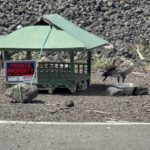The DLNR directed the removal of cat-feeding stations at the Queens’ Marketplace in Waikoloa following complaints that the nēnē are being negatively impacted by the consumption of cat food and close contact with feral cats.
While Queens’ Marketplace did not install the feeding stations, which are located in the back parking lot, it has agreed to remove them. The stations will be returned to the nonprofit organization that feeds the feral cats located throughout the Waikoloa Beach Resort community.
In a recent letter sent to Alexander & Baldwin (A&B), the owner of the Queens’ Marketplace, DLNR Chair Dawn Chang noted, “The endangered nēnē have been observed consuming the cat food and regularly spending time among the feral cat colony which has resulted in harm to nēnē.”
The DLNR letter cites numerous potential impacts to the federally threatened species, and state-listed endangered species including:
- Cat food is a not a natural diet item for nēnē.
- Cat feeding affects the natural behaviors of nēnē, bringing them into close contact with people and roads, exposing them to dangers from vehicles, dogs, feral cats and mongoose.
- Feeding ‘habituates’ nēnē to humans, leading to separation from their natural environment and further reliance on feeding stations.
- Cats are known carriers of the infection toxoplasmosis which is a leading cause of death for nēnē.
Chang’s letter added, “While we recognize that some members of the community feel a strong attachment to feral cats, DLNR’s mission and mandate is to protect and preserve these endangered and endemic species.”
The DLNR Division of Forestry and Wildlife (DOFAW) and the DLNR Division of Conservation and Resources Enforcement (DOCARE), confirmed the feeding of nēnē was happening. U.S. Fish and Wildlife Service was consulted and considers the feeding an illegal take.
If A&B does not comply with the DLNR directive to remove the cat-feeding stations from its property, and prohibit further feeding, it could face penalties for illegal take of a protected species.
A&B has until April 25 to remove the cat-feeding stations and has informed DLNR it intends to meet that deadline.
In addition to removing cat feeding stations, DLNR suggests that action be taken to capture feral cats and remove them from the landscape, as they pose a threat to nēnē and other native wildlife through direct predation and spreading toxoplasmosis.
DLNR Photo
